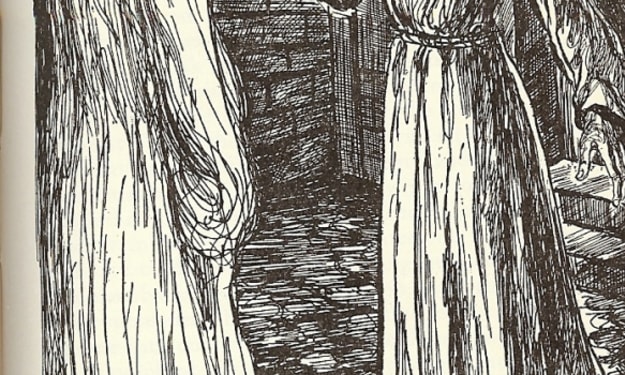Outcasts in "Lolita"
Alienation From Society and the Dissolving of Moral Boundaries in "Lolita"

Written by Russian-American novelist Vladimir Nabokov, Lolita takes us into the head of a 39 year-old Humbert Humbert and his relationship with a 12 year-old girl “Lolita.”
H. Humbert Before Lolita
Humbert Humbert is attracted to prepubescent girls (whom he calls “nymphets”) ever since having an unforgettable, dreamy summer fling in his youth with a girl called Annabel.
In the beginning, H. Humbert manages to hide his hebophilia by resisting to act on his sexual urges; the most he does is to observe children playing from a distance. We see some of his unsuccessful attempts to correct his hebophilia: he experiments with prostitutes and even marries a woman (who later leaves him for a taxi driver).
H. Humbert meets Lolita
Figuring a need for a change, Humbert Humbert moves to the U.S. from Europe and searches for a place to stay as a lodger. He is introduced to the widowed Mrs. Haze, who has a 12 year-old daughter called Dolores Haze. He instantly falls in love with Dolores as she closely resembles his childhood love Annabel. He starts to call her by the name, “Lolita.”
“It was the same child—the same frail, honey-hued shoulders, the same silky supple bare back, the same chestnut head of hair. A polka-dotted black kerchief tied around her chest hid from my aging ape eyes, but not from the gaze of young memory, the juvenile breasts I had fondled one immortal day...” (Part 1, ch. 10)
As we can predict, H. Humbert decides to live with the Hazes. During his stay, he receives a love letter by which he discovers that Mrs. Haze, Dolores' mother, had fallen in love with him. Utterly disgusted, he thinks of rejecting her but suddenly has devises that he could marry her to get closer to Lolita...
The Death of Mrs. Haze
A few months into their marriage, Mrs. Haze dies in a car accident. Mrs. Haze's death is a major turning point in the plot because suddenly H. Humbert is Lolita's only guardian. The moment he is given full custody of her, he does not hold back.
He begins to have a sexual relationship with Lolita and they travel around the U.S. From this point on, he starts to exploit Lolita's powerlessness to fulfill his desires.
The Two Outcasts
To get into the main topic, both H. Humbert and Lolita are outcasts, which influences how their personalities develop.
H. Humbert is a hebophile, attracted to pubescent children between the age of 11-14 (a pedophile is attracted to pre-pubescent children younger than 11). By having a sexual preference that is different from what is deemed appropriate by society, he is already an outcast. His attempts to integrate into society are done in vain, and he deviates further from society by surrendering to his sexual desires.
Lolita lives a different life compared to her peers, making her an outcast. Having lost her mother at a young age, she has no real family. She is taken advantage of by her only guardian, and that is what her everyday life is like.
Physical Separation from Society
What makes the two further like outcasts is the fact that H. Humbert and Lolita are physically separated from the rest of America. As they travel around the U.S., they wander around constantly from place to place. They don't belong to a single fixed place.
As the two become physically alienated from society, they create their own moral territory. To quote SparkNotes, “In open, unfamiliar territory, Humbert and Lolita form their own set of rules, where normal sexual and familial relationships become twisted and corrupt.”
As a result, they both have a morally distorted view of themselves compared to everybody else. “Both Humbert and Lolita have become so disconnected from ordinary society that neither can fully recognize how morally depraved their actions are. Humbert cannot see his own monstrosity, and Lolita shows only occasional awareness of herself as a victim.” (SparkNotes, "Themes")
H. Humbert's monstrosity
H. Humbert is evil because he sexually abuses Lolita of course, but also because he silences her. He creates his own version of Lolita in his head, and fails to consider her as a human being with emotions.
There is not a single moment in which H. Humbert expresses even the tiniest bit of care for Lolita. There are instances when H. Humbert buys souvenirs for her during their road trips, but this is done with a malicious intent—to keep Lolita satisfied so he can get sex from her.
“I relied on three other methods to keep my pubescent concubine in submission and passable temper” (Part 2 ch. 1).
“Every morning during our yearlong travels I had to devise some expectation, some special point in space and time for her to look forward to bedtime...” (Part 2 ch. 1)
This is symbolized by the use of the nickname H. Humbert creates, “Lolita.” While others address her by her real name “Dolores,” H. Humbert is the only one who calls her by the nickname. The clear distinction between the names “Dolores” and “Lolita” differentiates the two identities—“Dolores” is a young girl with her own thoughts and feelings, whereas “Lolita” is merely H. Humbert's object of desire who doesn't have feelings.
“Now, squirming and pleading with my own memory, I recall that on this and similar occasions, it was always my habit and method to ignore Lolita's state of mind while comforting my base self” (Part 2, ch. 33).
H. Humbert's monstrosity comes from how he strips Lolita of her individualism and he objectifies her. Alienation from society leads to the degradation of H. Humbert's moral principles, and as a result, he is unable to view his own actions properly and see just how abominable his behavior is.
Lolita's lack of self-awareness
In turn, Lolita is affected by being silenced and never given a voice. Even though we are only given H. Humbert’s point of view, we still see that she suffers greatly. Often, she cries at night out of grief for her mother and loneliness. She feels very lonely and isolated living with H. Humbert, but she has no choice but to stay—she doesn't belong anywhere.
“At the hotel we had separate rooms, but in the middle of the night she came sobbing into mine, and we made it up very gently. You see, she had absolutely nowhere else to go” (Part 1, ch. 33)
“[O]ur long journey had only defiled with a sinuous trail of slime the lovely, trustful, dreamy, enormous country that by then, in retrospect, was no more to us than a collection of dog-eared maps, ruined tour books, old ties, and her sobs in the night, every night—the moment I feigned sleep” (Part 2, ch. 3)
Lolita shows a lack of self-awareness because she is abused from a young age and has never known otherwise. When she meets H. Humbert several years later as an adult, she greets him happily and refers to him as “my dad.” Contrary to what we would expect, she doesn’t feel resentful towards her abuser at all. Her emotions have been numbed from enduring all those years of distress.
Alienation from society leaves Lolita unable to comprehend the idea of individuality. In the rare occasions that Lolita speaks during H. Humbert's narration, she mumbles things that a normal child would not say. Always being silenced and uncared for, she suffers alone and isn't aware of it.
“[M]y Lolita remarked: 'You know, what's so dreadful about dying is that you are completely on your own'...” (Part 2, ch. 33)
Conclusion
There are a number of themes in Lolita, but this one affected my own view of the novel the most. Being outcasts gives way to H. Humbert's perversion and Lolita's lack of awareness as a victim. As they become further and further separated from society, both become absorbed in their distorted self-image.
Though his flowery, poetic prose coupled with dark humor make H. Humbert oddly sympathetic as a narrator, what he did is inexcusable. We can clearly see that his actions cause Lolita great sorrow.
“I loved you. I was a pentapod monster, but I loved you. I was depicable and brutal, and turpid, and everything, mais je t'aimais, je t'aimais! And there were times when I knew how you felt, and it was hell to know it, my little one. Lolita girl, brave Dolly Schiller” (Part 2, ch. 33)
No matter how passionate his love for Lolita may be, H. Humbert is an evil person who, ultimately, deprives a little girl of her childhood.






Comments
There are no comments for this story
Be the first to respond and start the conversation.